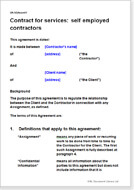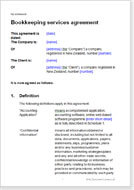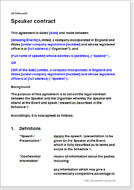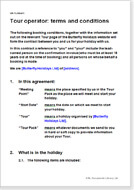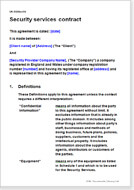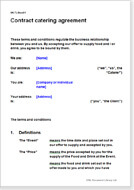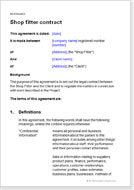Service contracts for businesses
These service contracts for businesses are largely in the form of non-negotiable terms and conditions. However, they can adapted to form individual contracts. The agreements cover a range of different industries.
Contract for services: self employed contractors
Contract for a self employed person engaged in any kind of work. Emphasises their self employed status.
Bookkeeping services agreement
This is a comprehensive agreement between a company providing bookkeeping and accountancy services and a client business.
Speaker contract
This is a contract between an organiser and a speaker to talk or to present at an event. It is a comprehensive yet flexible document suitable for a wide variety of engagements, from after dinner speeches, to corporate training events, to conferences and trade shows. Use it to clarify the terms of the agreement including the responsibilities of both the organiser and the speaker, and to give you a high level of intellectual property protection.
Tour operator: terms and conditions
Comprehensive terms and conditions template for a travel company or tour operator where clients organise their own flights and travel to the meeting point. It can be easily customised to your precise requirements, whether you offer walking tours, weekend breaks, or much longer holidays in Europe.
Security services contract
This agreement is useful for both, the security service provider and to the client (which may be an industrial unit, shopping center, hospital, residential society, school or any other organisations) on payment of agreed fee and the client who wishes to engage the security agency for the security of its industrial or institutional premises.
Contract catering agreement
Professional terms and conditions for an individual or company caterer, providing a standard form of quotation detailing the client's precise requirements. Ideal for use for weddings, parties, corporate functions and all other events.
Shop fitter's business terms
This is a terms and conditions document for a shop fitter. It is assumed that the business is operated through a company and may be of any size. Although you will edit this document to create standard terms, you will probably be willing to make small changes for each client or to accommodate different types of work.

If the document isn’t right for your circumstances for any reason, just tell us and we’ll refund you in full immediately.

We avoid legal terminology unless necessary. Plain English makes our documents easy to understand, easy to edit and more likely to be accepted.

You don’t need legal knowledge to use our documents. We explain what to edit and how in the guidance notes included at the end of the document.

Email us with questions about editing your document. Use our Lawyer Assist service if you’d like our legal team to check your document will do as you intend.

Our documents comply with the latest relevant law. Our lawyers regularly review how new law affects each document in our library.
What is a contract for services?
A contract for services is a generic name for an agreement for a business (a contractor) to provide services to another party (the client) in exchange for payment.
The contractor could be a self-employed individual, a partnership or a company.
The client could be a private individual (often referred to as a consumer) or an organisation, or even more than one individuals (such as a married couple) or organisations (such as those in partnership).
The nature of the services could be any – from giving an opinion to producing something to the client’s specification. The services could be a single project, end on a specific date, or be for on-going work.
The contractor is sometimes referred to as the service provider. A contractor can be a person or a business. The term is often used to refer to a someone who is self-employed, running their own one-person business. They usually have a specific skill that they sell.
The terms client and customer can be used interchangeably. We tend to refer to clients when a service is being provided or an end product is an intangible one, and customers when the end product is physical.
A contract for services is also known as:
- a general service contract
- a service level agreement (abbreviated to SLA)
- a services agreement
It may also be called terms of service, because it sets out the terms and conditions of the working arrangement between the contractor and the client.
Why use a written contract for services?
The reason to use a written agreement is to avoid misunderstandings or future disagreements as to what was agreed. This can be beneficial to both sides – to ensure that the work done was the work that the client requested, and to ensure that the client pays in full and on time.
The most important terms for both sides are likely to be a description of the work to be done (sometimes referred to in a schedule to the agreement), deadlines and the price.
For the contractor, a contract for services is also likely to contain terms that reduce their liability for unforseen problems and make the client responsible for ensuring that it is possible to carry out the work. It gives them more legal protection than they would have by default.
Comparison with employment
If you ask ‘what is a contract for service?’, the answer often given is that it is the opposite of a contract of service, otherwise known as an employment contract.
Contractors do not have the same rights in law as employees – labor laws do not apply because they are not employed.
The advantage to a business of hiring a contractor is that they can obtain the specialised skills of the external worker without taking them on as an employee (with the employer obligations that involves). In order not to be classified as an employee, the contractor must be able to show that they are an independent business, often by a combination of:
- having more than one client
- using their own tools, equipment and software
- invoicing their clients as a separate business
- using their own employees or subcontractors
- having no recourse to employee benefits or protections in their contract
What terms should be included in a service contract?
A service agreement will set out:
Duration of the contract: when it starts, and whether the contract covers a single job, is for a duration of time, or is indefinite.
Service to be provided: either in detail, or generally with reference to other schedules of work.
Parties to the agreement: naming the client and the contractor and giving their addresses and New Zealand Business Numbers (NZBN), if applicable.
Payment details: the price that the contractor will charge (sometimes an hourly rate, sometimes a day rate and sometimes a project rate) and if a deposit will be taken, a deposit amount. Invoice and payment dates should be given, as well as whether payments may be made in instalments. There may be an interest rate that the parties agree can be charged on late payments.
Expenses: whether the contractor can be reimbursed by the client for work related expenses they incur, and if so, in relation to what and how much.
Intellectual Property: usually the person who creates intellectual property is the owner. If the IP is created while working on the client’s contract, the client will usually want the service provider to transfer rights in it to them.
Confidentiality: the contractor will come across all sorts of confidential information, including perhaps that they are carrying out the work. Non-disclosure clauses can make sure neither side releases sensitive information.
Termination: gives the notice period each party can give the other to end the contract, and sets out what happens at and after termination.
Types of contractors
Building contractors
The term building contractor may refer to a construction company or a building tradesman. Both would be hired to work on a specific project that requires skilled labor.
Their contract for services could be called a building trades contract.
Consultants
Specialist advice is a common service provided. Advisors are often called consultants, and their contract for services is called a consultancy agreement.
Freelancers
The term free-lance was first used by Sir Walter Scott in his novel Ivanhoe to describe a medieval mercenary warrior that had not sworn an oath of alligiance to any lord’s service (literally, a free lance).
Nowadays, a freelancer tends to be someone who is self-employed and works in technology or creative industries.
A modern freelancer also works under a contract for services, although their agreement might be also called a freelancing agreement.
All rights reserved

